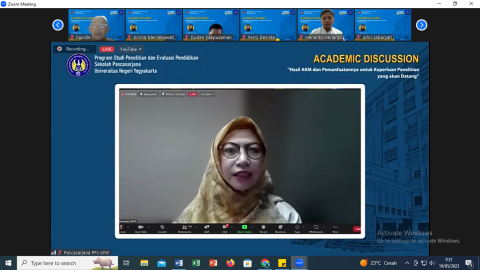You are here
MINIMUM COMPETENCY ASSESSMENT AS CONTEXTUAL ASSESSMENT TO MEASURE REASONING ABILITY

.
"Minimum Competency Assessment (AKM) is an assessment of the fundamental competencies needed by all learners to be able to develop self-capacity and participate positively in society," said the Head of the Education Testing Management Center (BP3), Dr. Rahmawati, ST., M.Ed. The Academic Discussion activity held by the PEP S3 Study Program discusses the competencies assessed, including logical-systematic thinking skills, the ability to reason using concepts and knowledge learned, and the skills to sort and process information.
Furthermore, AKM presents problems with various contexts expected to be solved by students using reading literacy and numeracy competencies. AKM is also intended to measure competencies in depth, not just content mastery.
Two competencies will be measured through AKM, namely Literacy and Numeracy. Literacy Assessment aims to measure the ability to understand, use, evaluate, and reflect on various types of texts to solve problems and develop Individual capacity as global citizens to contribute productively to society.
Then there is Numeracy, which is carried out to measure the ability to think using mathematical concepts, procedures, facts, and tools to solve everyday problems in various contexts that are relevant to individuals as citizens of Indonesia and the world. Rahmawati continued to explain this via Zoom Meeting.
In this activity, which was attended by PEP students, lecturers, and alums, Rahmawati explained that in AKM, competencies related to literacy and Numeracy will be reviewed from 3 (three) aspects: content, cognitive processes, and context. AKM questions consist of multiple choice, complex multiple choice, matching, short form, and description. AKM is compiled based on competency indicators that form a continuum of learning outcomes and competency trajectories. (medc/ant)

FAKULTAS DI UNY
- Fakultas Ilmu Pendidikan
- Fakultas Bahasa, Seni, dan Budaya
- Fakultas Matematika dan Ilmu Pengetahuan Alam
- Fakultas Ilmu Sosial dan Ilmu Politik
- Fakultas Teknik
- Fakultas Ilmu Keolahragaan dan Kesehatan
- Fakultas Ekonomi dan Bisnis
- Fakultas Vokasi
- Fakultas Psikologi
- Fakultas Hukum
- Fakultas Kedokteran
- Sekolah Pascasarjana
SEKOLAH PASCASARJANA UNY
Kampus Karangmalang, Yogyakarta 55281
Telp. +62274-550836 (front office)
Fax. +62274-520326 Email: pps@uny.ac.id, humas_pps@uny.ac.id
Website : http://sps.uny.ac.id
Copyright © 2026,


